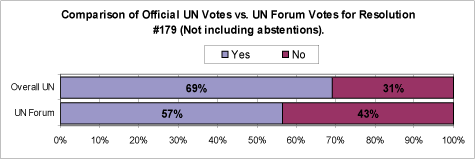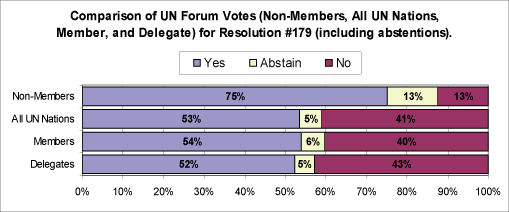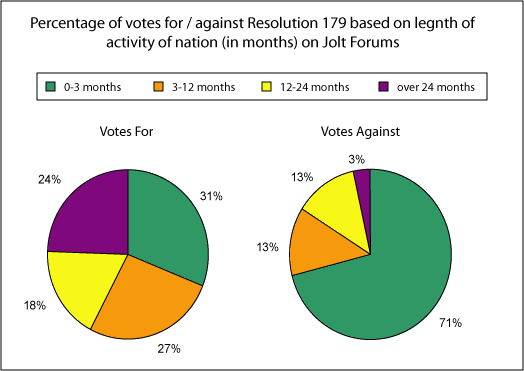Difference between revisions of "Freedom of Assembly"
Mikitivity (Talk | contribs) m (→Voting analysis: Adding images supporting voting analysis) |
|||
| Line 72: | Line 72: | ||
==Voting analysis== | ==Voting analysis== | ||
| − | A poll was attached to the UN Floor Debate thread, asking [[UN Delegate]]s, UN | + | A poll was attached to the UN Floor Debate thread, asking [[UN Delegate]]s, [[UN Member]]s, and Non-UN Members if they supported, opposed, or were indifferent to the resolution. This poll was the first time that a UN forum poll also allowed Non-UN Members a more formal way to have their support or opposition to a UN resolution registered with the organization. |
| + | |||
| + | {{Image|http://i26.photobucket.com/albums/c111/mcalamari/NationStates/Res179a.gif|||}} | ||
| + | |||
| + | {{Image|http://i26.photobucket.com/albums/c111/mcalamari/NationStates/Res179c.gif|||}} | ||
| + | |||
| + | {{Image|http://i26.photobucket.com/albums/c111/mcalamari/NationStates/Res179b.gif|||}} | ||
==Additional materials== | ==Additional materials== | ||
Revision as of 02:04, 14 October 2006
| #179: Freedom of Assembly
| |
|---|---|
| Category: | Furtherment of Democracy |
| Proposed By: | Mikitivity |
| Strength: | Mild |
| Status: | Passed |
| Adopted: | Thu Oct 5 2006 |
| Votes For: | 9,338 |
| Votes Against: | 4,153 |
Freedom of Assembly is the fifth resolution sponsored by Mikitivity and the 14th Furtherment of Democracy resolution to be adopted by the United Nations. Though the resolution is 18th resolution sponsored by a member nation of the International Democratic Union, it was the region's first Furtherment of Democracy resolution. The resolution extended article 3 of the Universal Bill of Rights to further define that citizens of nations should have the legal right to peacefully assemble and organize political parties on the condition that these organizations are not actively promoting violence. The resolution was adopted by a supermajority vote in early October 2006.
Contents
Resolution history
Draft proposal
The Freedom of Assembly resolution was based on a proposal, Freedom of Extreme Beliefs, originally submitted by North Suffolk in August 2006. The UN Secretariat from the Most Glorious Hack called attention to the idea behind North Suffolk's proposal which lead to a number of UN members working on a more comprehensive draft proposal. Unfortunately, when Mikitivity contacted North Suffolk to arrange a collaboration, North Suffolk was no longer available. In a matter of weeks a final working draft, titled Freedom of Assembly had been agreed upon by an ad hoc committee composed of Ambassadors and diplomatic staff from a number of nations.
Telegram campaign
The Freedom of Assembly proposal was first submitted to the proposal queue in mid-August 2006. The proposal did not go through any significant changes. Twice, its sponsoring nation, Mikitivity, carpetted hundreds of UN Delegates with telegrams seeking support. After 7 submissions to the proposal queue, the proposal established quorum on Mon Sep 25 2006. Prior to reaching the UN Floor, the proposal recieved over 200 UN Delegate approvals. However, the proposal sat in the resolution queue for several extras while the Outlaw Necrophilia resolution was being debated.
UN floor debate
The resolution reached the UN floor on Sep. 30, 2006 and was characterized by a small debate between a few nations. Ambassador Howie Katzman of Mikitivity first introduced the background materials including transcripts of the draft proposal discussions and text of the Universal Bill of Rights in his opening address to the United Nations. In its first day on the UN floor, a number of nations, including Ariddia, Ceorana, Karmicaria, and Norderia, immediately spoke in favour of the resolution. By the second day, a number of dictatorships began to speak out in opposition to the resolution on grounds that it promoted political freedoms. Lord Kenneth Fowl of Risban asserted that freedom of assembly would lead to riots and in extreme cases outright rebellion. The early division of democratic governments immediately voting in favour and dictatorships voting against characterized the entire 5-day debate.
On the second day of debate, Ambassador Katzman and Deputy Ambassador Cassandra Thonberger both presented a formal opening speech in support of the resolution. Katzman focused on the international justification for such a resolution, citing that disenfranchisement frequently leads to expatriotism and the formation of violent opposition groups that would actively seek radical changes in their home nations. The ambassador argued that by increasing the political freedoms of citizens by allowing the formation of legal, but peaceful opposition parties, that terrorist organizations would have a harder time at recruitment. However, he warned that by not allowing freedom of assembly, that these groups would not only gain domestic support, but would also move their operations to neighboring nations and in doing so would threaten regional peace and security.[1], [2]
Thonberger took a different approach and cited Mikitivity's historical experience with domestic terrorism as their justification for promoting the resolution. She pointed to the conflict between Miervatia and Aslan cantons in the 18th century, focusing on a terrorist group known as the Aslan Faction.[3]
Not all dictatorships were opposed to the resolution, Ambassador Oskar Feldstein of Kivisto spoke in favour of the resolution addressing numerous questions and complaints raised by other dictatorships. He pointed out, "Public assembly and democracy do not go hand in hand. I'm certain the religious Wenaists of Gruenberg assemble on regular occassions for any number of reasons." [4]
Resolution text
| Category: | The Furtherment of Democracy | Strength: | Mild | Proposed By: | Mikitivity |
|---|
Description:
The NationStates United Nations,
CONVINCED that the expression of different political opinions is crucial to the democratic process,
TAKING NOTE of article 3 of its resolution The Universal Bill of Rights, which grants individuals the right to peacefully assemble,
APPALLED that in some extreme cases the expression of these opinions has moved from political expressions into actual physical acts, sometimes resulting in harm to other people or the destruction of public or private property,
AWARE that the reaction towards the harm of others or the destruction of public or private property has been to not only restrict these acts, but to also discourage the expression of extreme differences in opinion and to prohibit the formation of political opposition groups,
1. REAFFIRMS the equal right of individuals to freely express any opinions in a political process, provided that these opinions do not result in harm to other people or to public or private property without consent,
2. ASSERTS that individuals should have the right to freely assemble with others who share even extreme political views in appropriate venues, in order to better work within domestic and international political systems in a peaceful way,
3. CONFIRMS that the right to assembly includes the formation and coordination of political opposition organizations, which should be permitted to advocate radical changes in their existing government or political system,
4. CONDEMNS any political organization that advocates harm to other people or to public or private property as a means to spread terror or to gain political influence,
5. CALLS UPON political organizations to seek political change through peaceful means, and
6. ENCOURAGES national governments to open their elections and political process to any political organization that is seeking to voice its opinions through peaceful means.
- Votes For: 9,338
- Votes Against: 4,153
- Implemented: Thu Oct 5 2006
Voting analysis
A poll was attached to the UN Floor Debate thread, asking UN Delegates, UN Members, and Non-UN Members if they supported, opposed, or were indifferent to the resolution. This poll was the first time that a UN forum poll also allowed Non-UN Members a more formal way to have their support or opposition to a UN resolution registered with the organization.
</div> </div> </div>Additional materials
- Freedom of Assembly UN Floor Debate
- Freedom of Assembly Draft proposal discussions
- The Universal Bill of Rights
- UN Timeline
- Index of UN Resolutions
- United Nations



